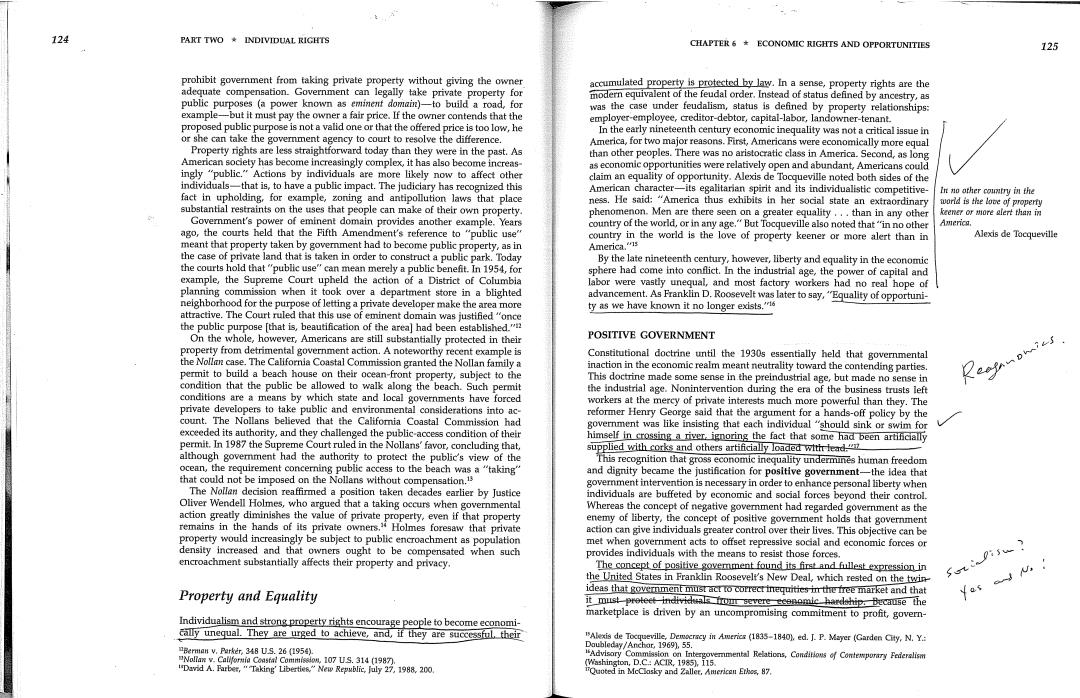正在加载图片...

124 PART TWO INDIVIDUAL RIGHTS CHAPTER 6*ECONOMIC RIGHTS AND OPPORTUNITIES 125 prohibit government from taking private property without giving the owner accumulated property is protected by law.In a sense,property rights are the adequate compensation.Government can legally take private property for modern equivalent of the feudal order.Instead of status defined by ancestry,as public purposes (a power known as eminenf domain)-to build a road,for was the case under feudalism,status is defined by property relationships: example-but it must pay the owner a fair price.If the owner contends that the employer-employee,creditor-debtor,capital-labor,landowner-tenant proposed public purpose is not a valid one or that the offered price is too low,he In the early nineteenth century economic inequality was not a critical issue in or she can take the government agency to court to resolve the difference. America,for two major reasons.First,Americans were economically more equal Property rights are less straightforward today than they were in the past.As than other peoples.There was no aristocratic class in America.Second,as long American society has become increasingly complex,it has also become increas- as economic opportunities were relatively open and abundant,Americans could ingly "public."Actions by individuals are more likely now to affect other claim an equality of opportunity.Alexis de Tooqueville noted both sides of the individuals-that is,to have a public impact.The judiciary has recognized this American character-its egalitarian spirit and its individualistic competitive- fact in upholding,for example,zoning and antipollution laws that place ness.He said:"America thus exhibits in her social state an extraordinary world is the love of property substantial restraints on the uses that people can make of their own property phenomenon.Men are there seen on a greater equality...than in any other keener or more alert than in Government's power of eminent domain provides another example.Years country of the world,or in any age."But Tocqueville also noted that"in no other America. ago,the courts held that the Fifth Amendment's reference to "public use" country in the world is the love of property keener or more alert than in Alexis de Tocqueville meant that property taken by govemment had to become public property,as in America."s the case of private land that is taken in order to construct a public park.Today By the late nineteenth century,however,liberty and equality in the economic the courts hold that "public use"can mean merely a public benefit.In 1954,for sphere had come into conflict.In the industrial age,the power of capital and example,the Supreme Court upheld the action of a District of Columbia labor were vastly unequal,and most factory workers had no real hope of planning commission when it took over a department store in a blighted neighborhood for the purpose of letting a private developer make the area more advancement.As Franklin D.Roosevelt was later to say,"Equality of opportuni- ty as we have known it no longer exists."1 the puble pure hat b hmd be h On the whole,however,Americans are still substantially protected in their POSITIVE GOVERNMENT property from detrimental government action.A noteworthy recent example is Constitutional doctrine until the 1930s essentially held that governmental the Nollan case.The California Coastal Commission granted the Nollan family a inaction in the economic realm meant neutrality toward the contending parties. permit to build a beach house on their ocean-front property,subject to the This doctrine made some sense in the preindustrial age,but made no sense in condition that the public be allowed to walk along the beach.Such permit the industrial age.Nonintervention during the era of the business trusts left conditions are a means by which state and local governments have forced workers at the mercy of private interests much more powerful than they.The private developers to take public and environmental considerations into ac. reformer Henry George said that the argument for a hands-off policy by the count.The Nollans believed that the Califomia Coastal Commission had government was like insisting that each individual "should sink or swim for exceeded its authority,and they challenged the public-access condition of their permit.In 1987 the Supreme Court ruled in the Nollans'favor,concluding that, himself in crossing a river.ignoring the fact that some had been artificially supplied with corks and others artificially loaded with fead. although government had the authority to protect the public's view of the ocean,the requirement concerning public access to the beach was a"taking" This recognition that gross economic inequality undermines human freedom and dignity became the justification for positive government-the idea that that could not be imposed on the Nollans without compensation.1 government intervention is necessary in order to enhance personal liberty when The Nollen decision reaffirmed a position taken decades earlier by Justice individuals are buffeted by economic and social forces beyond their control. Oliver Wendell Holmes,who argued that a taking occurs when governmental Whereas the concept of negative govemment had regarded government as the m e ramde ormem rha e enemy of liberty,the concept of positive govemment holds that government action can give individuals greater control over their lives.This objective can be property would increasingly be subject to public encroachment as population met when government acts to offset repressive social and economic forces or density increased and that owners ought to be compensated when such provides individuals with the means to resist those forces. encroachment substantially affects their property and privacy. The concept of positive govemment found its first and fullest expression in the United States in Franklin Roosevelt's New Deal,which rested on the twin Property and Equality ideas that government must act to correct inequities in the free market and that it must proteet indivicals from severe ecenomic hardship.Because the marketplace is driven by an uncompromising commitment to profit,govern- Individualism and strong property rights encourage people to become economi- cally unequal.They are urged to achieve,and,if they are successful,their Berman v.Parker,348 US.26 (1954). NolTan v.Callforsfa Coastal Commissl 107Us.314198刀 "David A.Farbes,"Taking'Liberties"New Republic,july 27,1988,200 T